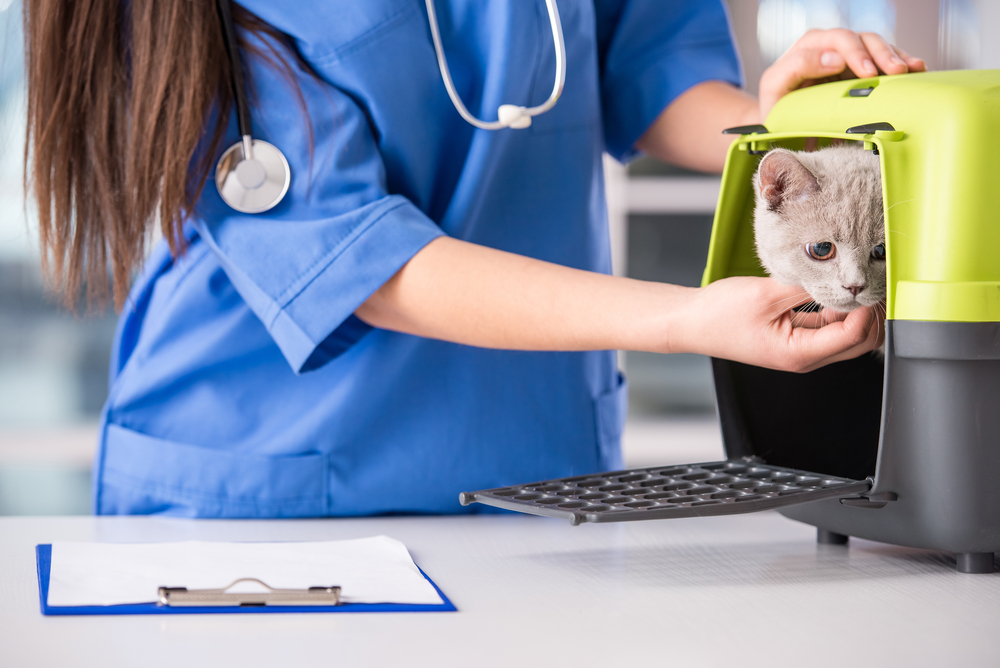You’ve likely heard friends and family complaining about how they can’t get their pet seen by a veterinarian the same day they call, or how an emergency veterinary visit turned into an all-night ordeal. Unfortunately, this situation is true throughout the entire country, and seems to be getting worse. The veterinary industry is overwhelmed, and struggling to see and care for pets in a timely manner. This is wreaking havoc on patient/client/owner relationships. How did this issue come about, and what can be done to fix it? Let’s dive into the problems plaguing pet care.
The COVID-19 pandemic protocols changed how veterinary hospitals operated
As the COVID-19 pandemic swept across the world, businesses scrambled to find innovative ways to operate, while keeping their staff and clients safe and healthy. Many veterinary hospitals switched to curbside care, where pets were brought into the hospital, and the owner waited outside to speak with the team over the phone. While this may be safer for COVID-19 exposure than allowing clients into the hospital, this method required numerous extra steps, and can turn what would normally be a quick appointment into an hour or more. This means we can see fewer patients each day, which results in having to reschedule the next day’s appointment, and so on until there is a backlog of patients needing essential care.
Since curbside protocols weren’t able to be ironed out overnight, many veterinary hospitals had to temporarily close, as they figured out how to serve their community without taking unnecessary health risks. Everyday problems such as illness, and needing to stay home with kids for school, made short-staffing issues worse, resulting in reduced business hours or additional days the hospital was closed. When hospitals reopened, they still likely stuck to their shorter hours or fewer days, and continued to be unable to see new patients, or those who required wellness care. A pet who needed vaccinations, or spaying or neutering, may have been put on a waiting list several months long, as pets with urgent needs were worked into the schedule first.
While we would all love to be back to “normal,” we are still dealing with the effects of the pandemic, including catching up with clients, and getting much needed face-to-face time with our patients. We don’t know when, or if, we will ever be back to where we were before the pandemic.
Pets have found new homes during the pandemic
Another reason for the overwhelming backlog of pets needing urgent veterinary care is the huge increase in the number of new patients and clients. According to a COVID-19 Pulse Study by the American Pet Products Association, 11.38 million American households adopted a pet during the pandemic. While it’s wonderful that so many pets found homes, they also need veterinary care.
In addition to pets who found new homes, existing pets suddenly were receiving their family’s undivided attention, because owners who were now spending so much extra time at home were noticing new issues with their pets, and seeking appointments.
This surge of new pets and new medical problems came at the same time that many hospitals were closing or limiting their hours, and that meant that waitlists grew even longer. While you might have waited a week or so to get an appointment before the pandemic, wait times can now be up to six weeks for an annual exam.
The nationwide staffing shortage is affecting the entire veterinary industry
One of the biggest reasons that you have to wait so long to see your veterinarian may be less obvious—a nationwide shortage of not only veterinarians, but also all the support staff members, such as veterinary technicians, assistants, and client service representatives (CSRs). These are the people who check in your pet, draw blood, give vaccines, and perform many other tasks for each appointment.
Many don’t realize it, but the veterinary industry is notorious for being difficult to work in—many veterinary professionals leave the field within five years. This is partially because the field is hard on our bodies. Anyone with a large dog knows how heavy they are—now imagine trying to draw blood on them! Veterinary medicine is also hard on our emotions. We not only deal with injured or dying pets, we also see the pet parents suffering. Having lost pets ourselves, know what that feels like. It can take a heavy toll, physically and emotionally. Today, veterinary professionals are leaving the field at an alarming rate. Whether from burnout, emotional trauma, injury, or being plain fed up from dealing with difficult pet parents, keeping a veterinary hospital fully staffed is becoming increasingly difficult.
Did you know that veterinary professionals have one of the highest suicide rates in the United States? Veterinarians and technicians are two to five times more likely to commit suicide, with men two to three times more likely to commit suicide than women. The people leaving the field are not simply looking for a change of scenery—many feel they have no other choice for their mental health. And these statistics are when we AREN’T in the middle of a pandemic!
All these factors mean that staff burnout is skyrocketing, and veterinary hospitals are having trouble keeping a full staff. They are shortening hours further, having to turn away new clients, and patients are suffering—and even dying—while they wait to be seen.
How American Canyon Veterinary Hospital is taking care of our team, patients, and clients
While all this sounds very dire, at American Canyon Veterinary Hospital, we know we can’t pour from an empty cup, and a burned out, fatigued team will not be able to do their best when caring for your pet. Instead of overwhelming our team by seeing as many patients as possible during the day, we focus on quality, not quantity. This may mean you have to wait a bit longer for an appointment, but rest assured we are juggling and squeezing every free minute we have to be able to get your pet in to see us.
The best way to care for your pet is to care for the people working with them. With this thought in mind, and the negativity currently surrounding the veterinary industry, we’re concentrating our efforts on caring for and supporting our team’s mental, emotional, and physical health. We have increased wages, benefits, and bonuses, added employee assistance plans for mental health support, and decreased our hours to lower the workload’s impact on our team, and to make work-life balance the number one priority.
While we do everything we can to care for our team, patients, and clients, compassion fatigue is a serious problem plaguing the industry. As veterinary professionals, we are naturally empathetic, and we want to help every pet, but that’s not physically possible. No matter how much we support mental healthcare in our practice, when an upset client yells at our team, and says that we don’t care about animals, or that we are heartless because we can’t help immediately, it hurts us. Disgruntled clients who take out their negative emotions on veterinary professionals are an overwhelming problem, and it’s only gotten worse with the pandemic.
We love your pets more than you know. When we hear “You are only in this for the money” or we get yelled at for not being able to see a pet, it hurts us because it simply isn’t true. To become a veterinary technician, you need a 2 year training program which can cost thousands of dollars to complete. The national average salary for veterinary technicians is $16.65 an hour. We do this not for the money, but because we love and care about your pets.
As veterinary suicide rates reach an all-time high, the industry is desperate to support our professionals. The Not One More Vet (NOMV) movement is working diligently to transform the status of mental wellness within the profession so veterinary professionals can survive, and thrive, through education, resources, and support. This organization is making tremendous strides in the mental wellbeing of veterinary professionals, predominately by drawing attention to the critical issues affecting our industry, and by ensuring no one ever feels alone. We can only hope that enough progress will be made so that working in veterinary medicine becomes enjoyable again.
How you can help support your veterinary team

Despite the many issues currently plaguing the veterinary industry, as a pet owner and client, you can help by:
- Staying on top of your pet’s preventive care— Schedule your pet’s wellness exam well in advance, rather than at the last minute, to ensure they receive their vaccinations on time. Also, administer parasite prevention year-round, to avoid illnesses caused by fleas, ticks, mosquitoes, and intestinal parasites.
- Treating medical issues before they become serious — If your pet has been urinating frequent, small amounts, don’t wait to call until they are crying out in pain, or not urinating at all. Schedule an appointment at the first hint of illness, since problems are much easier—and more economical—to treat early on.
- Being kind and empathic — Understand that the veterinary industry is carrying a huge burden, and display kindness and compassion when scheduling your pet’s appointment. We understand your frustration and anxiety when we cannot see your pet right away, but try to avoid venting your anger on our hardworking team. Keep in mind that we have a limited number of pets we can see each day, and we do our best to care for the most critical cases first. Remember also that we’re all on the same team—working to ensure your pet receives the best care when needed.
If you need to schedule an appointment for your pet, bear in mind that we are booked out for about three weeks. We would love to see your pet the same day you call, but we will not compromise our care, or the level of medicine we provide. An overworked veterinary team is more likely to make costly errors, and we will not risk any pet’s life.
Help us continue to always provide the same gold standard of care and medicine by understanding the difficulties the veterinary industry is facing. Your kindness and understanding will go a long way when you call to schedule your pet’s appointment, and together we will get through this with happy healthy pets.










Leave A Comment